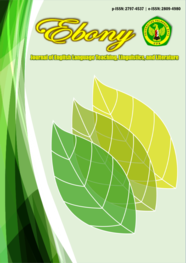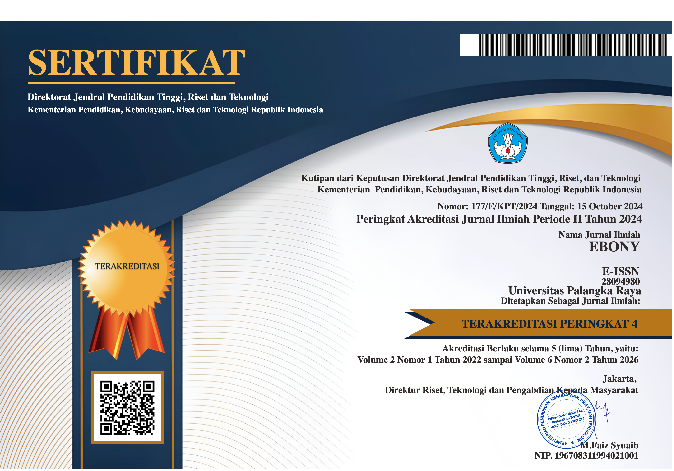Perceptual Alignment: Investigating EFL Teachers' Perspectives on Students' Writing Difficulties
DOI:
https://doi.org/10.37304/ebony.v5i1.18696Keywords:
English writing, pedagogical competence, students’ difficulties, teacher's perceptionAbstract
The study investigates the alignment between EFL teachers' perceptions of students' writing difficulties and the actual performance of students in vocabulary, grammar, organization, and mechanics. Using semi-structured interviews with five certified EFL teachers and written tests from 28 junior high school students, the research employs thematic and content analysis. Results show strong alignment in vocabulary and grammar, highlighting issues such as limited vocabulary range and frequent grammatical errors. However, significant misalignment is found in organization and mechanics, with teachers overestimating students' skills in structuring essays and using punctuation. The findings underscore the pressing need to address these gaps, as the misalignment between teacher perceptions and student performance hinders effective instruction and student progress in writing proficiency. Bridging this gap is crucial for fostering holistic EFL writing skills. Suggestions include structured feedback rubrics, peer evaluations, and professional development workshops to enhance teaching practices. This study contributes to improving EFL instruction by identifying gaps in teacher-student alignment and proposing targeted interventions for better writing proficiency.
Downloads
References
Adelita, D., Kurniati, E. Y., & Daulay, S. H. (2023). Difficulties and Strategies in Producing English Writing Text: What do EFL Students’ Perceive? Education and Human Development Journal, 8(1), 93–108. https://doi.org/10.33086/ehdj.v8i1.3698
Al-Ahdal, A. A. M. H., & Abduh, M. Y. M. (2021). English writing proficiency and apprehensions among Saudi College students: Facts and remedies. TESOL International Journal, 16(1), 34–56. https://eric.ed.gov/?id=EJ1329867
Alamri, H. R., & Yaseen, H. A. S. (2021). Exploring EFL teachers’ perspectives on sources of challenges in writing classroom. Studies in English Language Teaching, 9(5), p73. https://doi.org/10.22158/selt.v9n5p73
Alfalagg, A. R. (2020). Impact of teacher-student writing conferences on frequency and accuracy of using cohesive devices in EFL students’ writing. Asian-Pacific Journal of Second and Foreign Language Education, 5(1). https://doi.org/10.1186/s40862-020-00104-z
Alhujaylan, H. (2020). Evaluating the Effectiveness of Integrating Reading and Writing Pedagogy in EFL Setting and Teachers’ Perceptions. English Language Teaching, 13(5), 177. https://doi.org/10.5539/elt.v13n5p177
Bailey, C. A. (2018). A guide to Qualitative Field Research (3rd ed.). SAGE Publications, Incorporated.
Birt, L., Scott, S., Cavers, D., Campbell, C., & Walter, F. (2016). Member Checking: A Tool to Enhance Trustworthiness or Merely a Nod to Validation? Qualitative Health Research, 26(13), 1802–1811. https://doi.org/10.1177/1049732316654870
Bisriyah, M. (2022). EFL university students’ difficulties in the essay writing process. Scope Journal of English Language Teaching, 7(1), 66. https://doi.org/10.30998/scope.v7i1.13793
Borg, S. (2018). Teachers’ beliefs and classroom practices. In The Handbook of Language Awareness (Vol. 1, pp. 75–91). Routledge. https://doi.org/10.4324/9781315676494-5
Chen, Y., & Preston, J. C. (2021). Improving EFL Students’ Critical Thinking Skills through Organization Development Intervention Strategies at Zhejiang Yuexiu University in China. ABAC ODI Journal Vision, 9(1), 181–203. https://doi.org/10.14456/abacodijournal.2021.25
Cheng, X., Zhang, L. J., & Yan, Q. (2021). Exploring teacher written feedback in EFL writing classrooms: Beliefs and practices in interaction. Language Teaching Research. https://doi.org/10.1177/13621688211057665
Cui, Y., Schunn, C. D., Gai, X., Jiang, Y., & Wang, Z. (2021). Effects of Trained Peer vs. Teacher Feedback on EFL Students’ Writing Performance, Self-Efficacy, and Internalization of Motivation. Frontiers in Psychology, 12. https://doi.org/10.3389/fpsyg.2021.788474
Jashari, L. T., & Fojkar, M. D. (2019). Teachers’ perceptions of developing writing skills in the EFL classroom. ELOPE English Language Overseas Perspectives and Enquiries, 16(2), 77–90. https://doi.org/10.4312/elope.16.2.77-90
Mathew, P., Al-Mahrooqi, R., & Denman, C. (2017). Electronic intervention strategies in dynamic assessment in an Omani EFL classroom. In Revisiting EFL assessment: Critical perspectives (pp. 321–338). https://doi.org/10.1007/978-3-319-32601-6_18
Moussaoui, O., & Moubtassime, M. (2022). The Effects of the Flipped Classroom Model on University Students’ Writing Proficiency. Journal of English Language Teaching and Applied Linguistics, 4(2). https://doi.org/10.32996/jeltal.2022.4.2.5
Namaziandost, E., Homayouni, M., & Rahmani, P. (2020). The impact of cooperative learning approach on the development of EFL learners’ speaking fluency. Cogent Arts & Humanities, 7(1), 1780811. https://doi.org/10.1080/23311983.2020.1780811
Pojslova, B. (2021). The effect of two feedback strategies on EFL writing quality from the perspective of syntactic complexity. CASALC Review, 11(1), 69. https://doi.org/10.5817/casalc2021-1-7
Reyes, V. C., Reading, C., Doyle, H., & Gregory, S. (2017). Integrating ICT into teacher education programs from a TPACK perspective: Exploring perceptions of university lecturers. Computers & Education, 115, 1. https://doi.org/10.1016/j.compedu.2017.07.009
Rotjanawongchai, S. (2019). Teacher Cognition of Corrective Feedback in the EFL Speaking Classroom: A Case Study of Thai University Teachers [University of York]. https://etheses.whiterose.ac.uk/24630/
Sari, Y. R., Drajati, N. A., So, H.-J., & Sumardi, S. (2021). Enhancing EFL Teachers’ Technological Pedagogical Content Knowledge (TPACK) Competence Through Reflective Practice. TEFLIN Journal, 32(1), 117. https://doi.org/10.15639/teflinjournal.v32i1/117-133
Sasmita, Y. V, & Setyowati, L. (2021). Problems faced by EFL students in learning to write. Linguista Jurnal Ilmiah Bahasa Sastra Dan Pembelajarannya, 5(1), 11. https://doi.org/10.25273/linguista.v5i1.9404
Suthipiyapathra, S. (2021). Effects of Teacher-Student Conference on Paragraph Writing of EFL Students in Thailand. Universal Journal of Educational Research, 9(7). https://doi.org/10.13189/ujer.2021.090705
Trabelsi, S. (2021). (Mis)alignment in Relation to Written Corrective Feedback: the Teachers’ Beliefs and Practices vs the Students’ Preferences in an EFL Context. International Journal of Language and Linguistics, 9(1), 6. https://doi.org/10.11648/j.ijll.20210901.12
Tu, P. H. T., & Phung, V. D. (2023). The effects of teacher interactive feedback on EFL students’ paragraph writing performance. European Journal of English Language Teaching, 8(4). https://doi.org/10.46827/ejel.v8i4.5014
Downloads
Published
How to Cite
Issue
Section
License
Copyright (c) 2025 Novika Amalia

This work is licensed under a Creative Commons Attribution 4.0 International License.











